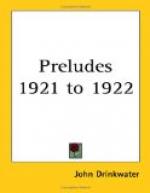DAVID AND JONATHAN
And Jonathan too had honour in his heart,
Jonathan who with an armour-bearer went
Alone by Michmash to the Philistines,
And met a spray of swords because of courage
That made him single greater than a host.
Jonathan too had known his battles, dared
At any hour the coming of death, because
In twilight silence he had walked with God,
Read Him in blossoms and the mountain brooks,
And learnt that death, well known, can alter nothing.
He was a brown man, burnt with love of summer,
His young beard curled, and russet as the eyes
That looked on life, and feared it, yet were master,
Because they knew the tyranny they feared,
Measured it, learnt it, gazed it into nothing.
....
And now he watched the boy, the son of Jesse,
David with hair like maples in October,
And skin that women loving coveted,
David with eyes that often by the sheepfolds
Had looked through leaves up to the folds of heaven,
And seeing them crammed with golden fleece of stars,
Had known how the blood can run because of beauty.
Jonathan watched him take the armour off
Given by Saul, and choose the bright smooth pebbles,
And walk out from the Israelitish throng
Into the field against the Philistine giant.
Watching, he snatched his sword and cried to Saul,
“Bid him come back. This murder must not
be.”
And as he spoke, he knew the words were treason,
His heart alone in all the world was sure
That David was the Lord’s appointed arm,
To meet this bulk of dirt, this giant fear
Brandishing out of the loathly camps of evil.
And before Saul could answer, he put down
The sword, and said, “I love him. Let him
go.”
....
But the words, I love him, were not for his father
Saul,
Hardly Jonathan knowing he spake them out.
But as he looked on David love was there,
Waking from that in David that he himself
A little was, and always greatly shaping
Himself towards, so that his name was spoken
Famously in Saul’s kingdom. It was courage,
The clean heart, undivided in its doing,
The purpose that, being bodied in the brain,
Thenceforth knew every trickling argument
That fell from tongues of persuading circumstance,
As lures of evil ever threatening life,
That Jonathan loved above all enterprise.
He knew, or the rarer man within him knew,
That once your yea in holy meditation
Had shaped itself in the perfect syllable,
Thenceforth no nay from any other tongue
Or wise or passionate or masterful,
Could be listened to without the shame of sin
Corrupting all your constancy for ever.
He knew the curse of good betraying good,
Till both in bleak irresolution fall.
And all his years was Jonathan’s anguish only
To keep this tillage of his wisdom clean.




